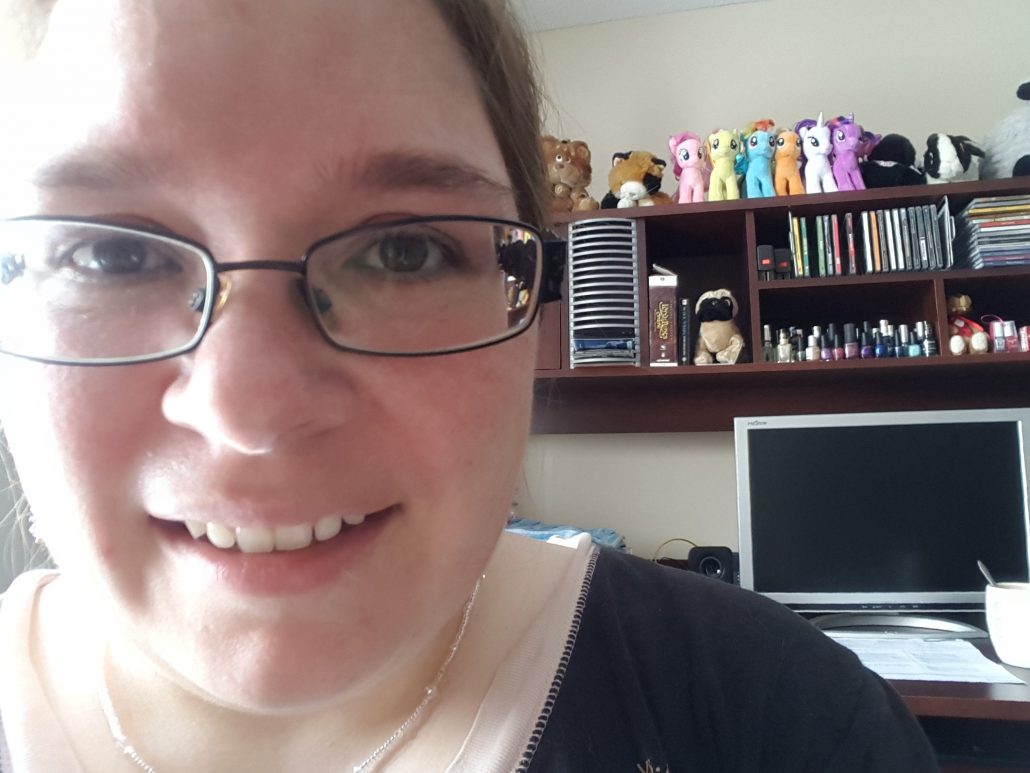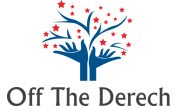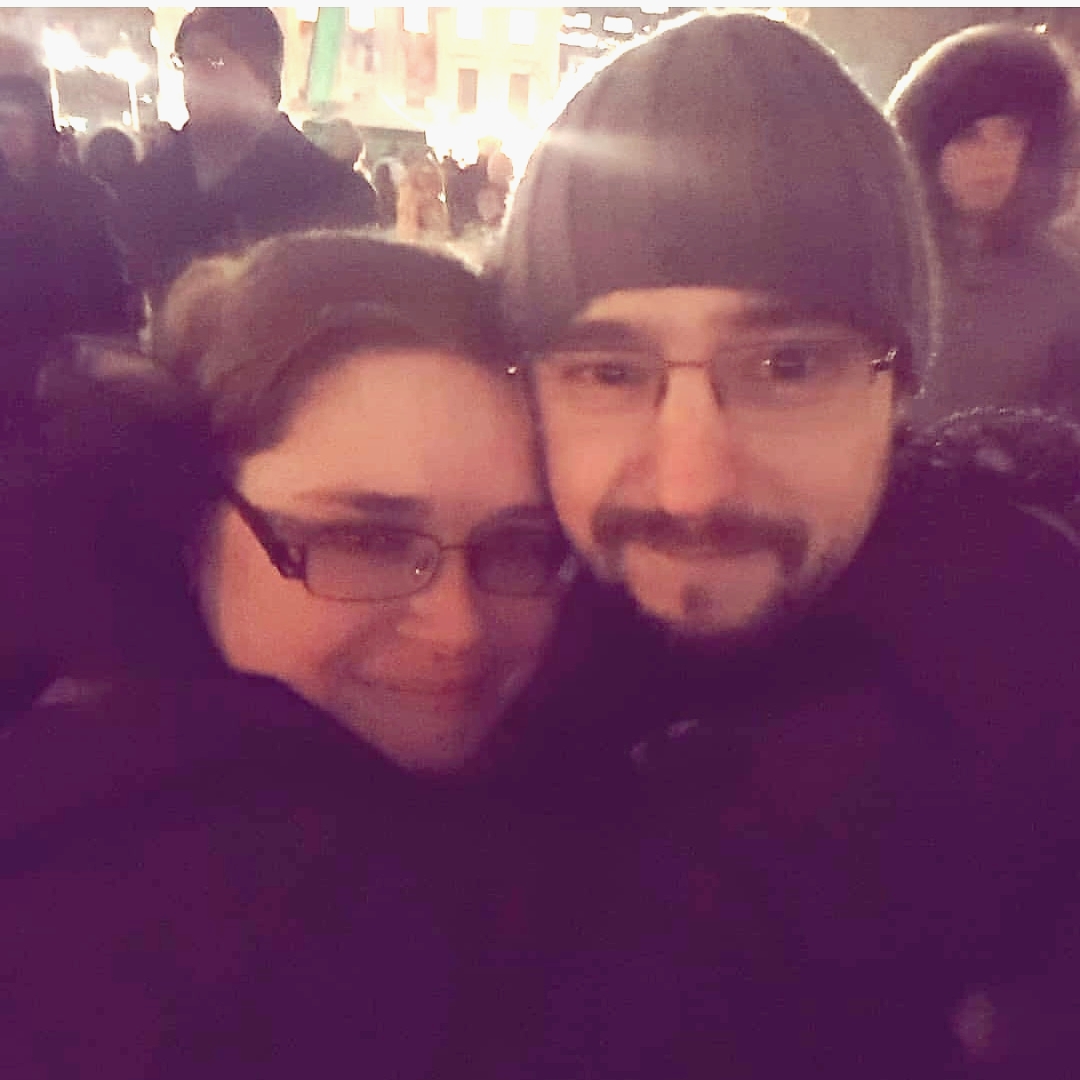Melissa is 37 years old and lives in Ottawa, Ontario with two cats 🙂
Hi Melissa, thanks for agreeing to do an interview. What can you tell us about your religious background?

Hi, thanks for having me! I grew up as an evangelical Christian, and was with the Baptist Church from birth until I was about 18 or so. Around the time I moved out on my own for the first time I started to question what I was raised to believe, and realized that Christianity wasn’t for me. I did some reading and researching, and I remembered taking a religion course in high school that really interested me, specifically the unit we did on Judaism. I didn’t know at the time that my parents were on their own journey, and eventually the three of us ended up deciding to convert to Judaism together.
That’s amazing! What attracted you to Judaism and what were your greatest influences?
Part of my influence was of course the fact that my parents were considering it too. But even from a young age I was curious about Judaism from listening in church about the Israelites in the Torah (Old Testament to me then). I can remember thinking to myself that ‘if it wasn’t for Jesus, I’d be Jewish.’ At the time, I was thinking (wrongly) of heredity, but as I grew older and began studying the Bible and other commentaries on my own, I realized how right I was. I couldn’t find, beyond what I’d been taught in church, any evidence that Jesus was who he said he was. And I was left with two options in my mind – become completely secular, or convert to Judaism. To me, the idea of living without any sort of relationship with God was not an option, so I started learning about Judaism. First on my own, and then with my parents.
What shuls and / or organizations did you get involved with?
The first organization I went to to start learning was the local Jewish Community Center. There I met many of the local Rabbis and educators, including taking various classes through JET (Jewish Education through Torah) that I really enjoyed. Once we started seriously talking about conversion, we were referred to one of the Orthodox synagogues and the head Rabbi of Ottawa at the time, Rabbi Bulka (he has since taken a well deserved retirement). I very much respect all of the people who helped me on my journey to become Jewish, and to be honest, these are the people I’m most concerned with disappointing now that I’ve decided to step away from Orthodox observance.
When did your first doubts creep in?
When you go through the conversion process, the Rabbi has to ‘turn you away three times’ before you’re accepted. One of the ways he tried to turn me away was ‘you may never marry’. At the time that was hard to hear, because I did want that then. I was very young, and I had always thought I would marry and have children, but I didn’t let it bother me. I wanted to be Jewish more than I wanted some man I have never met.
As I grew older and I saw my friends and other girls in the community getting married and having kids, many of them much younger than I am, it really hurt. That was the first doubt that creeped in. Thoughts of ‘if you hadn’t converted, you could be married/in a relationship by now’ would come up once in a while out of nowhere. I pushed them aside though, telling myself that I didn’t want or need that anyway, that I was happy in my observance and fulfilled by my friends and my relationship with Hashem. I basically took on the role of a Jewish ‘nun’, in a way, denying even my desire to have what everyone else had and I never would.
For many years I was happy with that, but as I got older, looking back, I saw how much I’ve missed out on. Not just relationship wise, but with my non-Jewish friends too. I worked five days a week, came home, had dinner, went to bed. Shabbos took up most of my weekend, and I had one day, Sunday, to do everything else (such as see friends or do anything fun with family). Very slowly, this very restrictive lifestyle started to wear on me. I felt like all I did was eat sleep and work, and I had no opportunity to do anything that makes the weeks any different from any other. All of my vacation days allotted at work were immediately eaten up by the Yomim Tovim, so I didn’t even have a chance to take holidays outside of those. And as years went by like this I started to become more and more depressed with the way my life had turned out. I felt trapped and restricted by the observance that used to have rich meaning for me.
Did you ever voice these feelings to people from within the community or was that somehow too difficult for you?
To be honest, I thought those feelings were a weakness and I didn’t want anyone to know, so I put on an outwardly happy facade. I had, after all, chosen this life, and I knew what I was getting into. I thought it was something that all Orthodox people went through at one time or another and it was just something I’d have to get through, and I’d come out the other side of it with greater faith. But instead, I ended up just going through the motions most of the time and becoming increasingly miserable. I gained a reputation with my family and friends for knowing the details of things like Kashrus, and people would ask me if something was kosher or acceptable, and that did make me feel good that they saw me that way, but I also felt pressured to be that for people. I enjoyed (and still do) learning Torah, specifically middos and the weekly parshas, but even with all of that, I still felt like I was slowly suffocating. And like the proverbial frog in the pot of boiling water, it took years for me to even realize it was happening.
About five years ago I got a job in the other end of the city where I lived as a child, and where a lot of my friends still live. It was like a breath of fresh air for me – suddenly I was with different people again, friends that I not only hadn’t seen in a long time, but who still cared about me and wanted to hang out. And because I spent most of my day in their area, I could. A year later (mostly due to the long commute) I made the decision to move out there, and it was my first step towards realizing that what I really needed was time away from the community. My mom blames this move for my recent decision to become less observant, but really, it was just the push I needed to stop lying to myself about what I was really feeling. For the first year or so my observance actually increased a little – I felt free to explore my faith on my own terms and, since I didn’t live near a shul anymore, the guilt of not regularly attending services due to work exhaustion was gone. Now I couldn’t go because I wasn’t in walking distance, and everyone knew it. So I read Torah and davened and observed Shabbos on my own (I was even inside the city Eruv.) My friends, who were and are completely supportive of my faith, made sure I didn’t break Shabbos but still got some fresh air and ‘took me out for walks’ because I couldn’t leave my apartment without someone to use the elevator or open the electronic front door of my building for me. It worked, but I was still ‘restless’. I had more time to see friends after work, now that the commute was gone, and now occasionally on Shabbos, but I still didn’t have a lot of time to do other things besides work, eat, sleep, repeat. I would occasionally go to my mom’s for Shabbos to still be a part of the community, but even my interest in that was waning. It became something I felt I had to do rather than what I wanted to do. I eventually confided my thoughts to my closest Jewish friend, and rather than being scandalized and shocked, she understood me and was supportive of what I was going through. She’s been a very good friend to me through all of this, and I think I would have probably just suffered in silence if it wasn’t for her patient acceptance.
Was there any community or other backlash after you decided this life wasn’t for you anymore?
I actually don’t know yet. As far as I know, nobody in the community besides my mom and my friend are aware that I’ve made this change. I couldn’t bring up the courage to tell them for fear of what it might mean for me in the community. But now I’m thinking the best way to tell them is to share this interview with them. It’s given me a structured way to work through what I’m feeling, and put my thoughts down in a coherent way, rather than being defensive and put on the spot with dozens of questions. If I’m shunned from the community, then so be it, but I really hope it won’t come to that. My feelings towards the people I’ve known for the past fifteen years haven’t changed, just my awareness of and my decisions for my own life path.
Do you feel guilty about leaving?
Yes and no. I feel very much that I let people down. So many people were involved in my Jewish life from the very beginning, guiding me and teaching me and including me in their Shabbos and Yom Tov observance. I’m not doing this to spite anyone though, I value my connection to the community. But I also have to value myself and my own happiness and mental health. [I went through a very bad depression about a year or so after I converted, and the community was a huge support for me during that time and I will be forever grateful for the help I received from local Rabbis, Rebbetzins and my friends, not to mention the many books by Rabbi Twerski that were an enormous comfort to me (and still are). ] I feel guilty that those people were so important to me for so long and I’ve basically just walked away from that. But I don’t feel guilty for putting myself first and taking care of myself and my direction in life. As my sister put it: ‘you noticed you were spiraling and made the decision to stop it. No shame in that.’
What’s life like for you, nowadays? Do you still have some beliefs or rituals that you cherish?
This is hard to say, even though I have been living this way for about six-eight months now. I am no longer shomer Shabbat, and only partially shomer Kashrut. I still won’t eat pork or shellfish, won’t mix milk and red meat, but I have with chicken. I’ve eaten out at treif restaurants(while carefully avoiding what I won’t eat), and decided to only observe the major holidays. I still dress tznius, though if I was to answer the door in pants it wouldn’t bother me as much as it used to. I am also dating a non-Jew whom I’ve gradually fallen in love with, and who loves me. I was shocked at how fast I was able to find someone outside of the community, and it really helped with my self-esteem and my certainty that I was doing the right thing for myself. He is amazing, and very supportive of my beliefs and the few restrictions I still hold. Contrary to what I’m sure most people will think though, he had nothing to do with my ‘relaxing’ of my observance. I made that choice long before I even met him.
I do, however, still identify as Jewish. I still learn from my books about middos and the parshah (I actually just bought myself a new Megillah for Purim). I don’t formally daven, but I do still talk to Hashem. I am sure, being the Creator of all and knowing the innermost hearts of all of us, He understands why I am doing what I am doing, even though He may not entirely agree with it. I still give tzedakah, I lit Chanukah candles last year, I am giving Mishloach Manot this year, and will be cleaning my kitchen and going to my mom’s for the two upcoming Pesach seders. Later in the year I’ll also stay with her for Shavuot, Rosh Hashanah, Yom Kippur, and Sukkot (though I will be working on the last two days of the eight day Yomim Tovim). I haven’t abandoned observance completely, just the parts I was doing out of rote obligation. What I have retained however, is even more meaningful to me now.
How do you see your future right now?
It’s funny, if you’d asked me that a year ago, I’d have said that I’ll be exactly the same at 60 as I am at 37 – single, Observant, working, keeping Kashrus, Shabbos, and Yom Tov, and scrounging for the few hours a week when I could do anything else but that. But now? The future is open for me. For personal reasons I don’t plan on ever getting married, but that doesn’t mean I can’t be with a partner who makes me happy. I have friends that I can actually do things with on the weekends and deepen friendships with. When I’m invited out I don’t have to turn people down because ‘I can’t, it’s Shabbos/Yom Tov/not kosher’. I can have actual life experiences now that I simply couldn’t have before when I was strictly observant. I know that when I chose to convert Orthodox I knew I was taking on a lot of very strict rules, but the person I was at 23 is a very different person from who I am now at 37. I have matured a lot, and one of the things I’ve learned in that time (the hard way) was that I have to do things for my own well-being and take charge of my own happiness, because nobody else is going to do it for me.



Leave a Reply